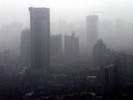 China’s smog-choked cities and contaminated waterways are leaving many people sick and unable to work, in turn fomenting unrest and threatening the country·s economic growth.
China’s smog-choked cities and contaminated waterways are leaving many people sick and unable to work, in turn fomenting unrest and threatening the country·s economic growth.
Concluding an 18-month review, the Organization for Economic Co-operation and Development said China’s severely polluted environment has caused “significant damage to human health,” hurting the country·s prospects for continued economic expansion.
“Clearly a healthy economy needs a healthy environment,” said Mario Amano, deputy secretary-general of the Paris-based OECD, which groups 30 industrialized countries.
Amano said he had no specific figure for the cost of China·s pollution. But the Chinese government said last year that pollution cost the country $64 billion in economic losses in 2004, about 3 percent of its economy that year. It has not given updated figures.
China·s rapid urbanization, industrialization and economic growth over the last nearly two decades has resulted in some of the world·s filthiest air, soil and water.
The OECD report, citing an earlier World Bank report, said that by 2020 China will have 600,000 premature deaths a year in urban areas and 20 million cases of respiratory illness a year because of pollution. The overall cost of health damage will be equal 13 percent of gross domestic product.
Some 190 million people are estimated to be suffering from illnesses related to dirty drinking water and more than 30,000 children die every year from diarrhea due to polluted water, it said.
Lorents Lorentsen, OECD·s environmental director, said pollution-related illnesses have hurt productivity, driven up health care costs and spurred social unrest.
That is “not good for the economy,” he said.
Amano and Lorentsen spoke at a news conference attended by Zhou Jian, vice director of China·s State Environmental Protection Administration or SEPA. Zhou said China would try to implement the report·s suggestions. China is not an OECD member, but the report was prepared at its request.
Farmers across the country have protested tainted water supplies and ruined farmland. SEPA director Zhou Shengxian acknowledged the unrest last week, saying the agency was receiving more environment-related petitions.
Lorentsen said China·s poor record on environmental issues threatens to damage its reputation as an exporter.
“If you have a reputation for being a polluted country, then you have a bad trademark abroad. It·s very hard to sell pharmaceuticals, to sell food and feed from a country that has a reputation for being polluted,” Lorentsen said.
Last month, the Food and Drug Administration placed restrictions on imports of Chinese farmed seafood, including shrimp, catfish, eel, basa and dace, after finding residues of drugs the U.S. does not allow in fish.
The FDA said sampling of fish found traces of the antibiotics nitrofuran and fluoroquinolone, as well as the antifungals malachite green and gentian violet.
But the toxic substances were not linked to pollution and all the restricted imports were farmed — not wild. More than half of China·s global seafood exports are farmed.
The report said China·s environmental efforts have “lacked effectiveness and efficiency,” mainly because existing regulations were not being implemented, particularly at the local level.
“Economic priorities have overridden environmental concerns,” it said.
The OECD recommended that China make the State Environmental Protection Administration a ministry-level body to give it more say in monitoring and enforcing environmental regulations.
It also said the government should be more transparent about the health impacts of pollution and allow greater “environmental democracy,” or participation from civil society, such as nongovernment groups, in cleaning up the country.
The limited availability of information on environmental health “limits the capacity of Chinese authorities and citizens to act in preventative or curative ways,” it said.


